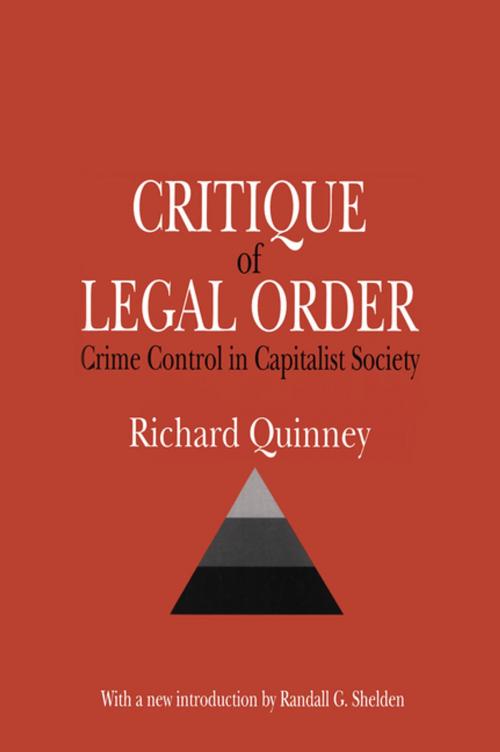Critique of the Legal Order
Crime Control in Capitalist Society
Nonfiction, Social & Cultural Studies, Social Science, Crimes & Criminals, Criminology, Sociology| Author: | Richard Quinney, Randall G. Shelden | ISBN: | 9781351320344 |
| Publisher: | Taylor and Francis | Publication: | February 6, 2018 |
| Imprint: | Routledge | Language: | English |
| Author: | Richard Quinney, Randall G. Shelden |
| ISBN: | 9781351320344 |
| Publisher: | Taylor and Francis |
| Publication: | February 6, 2018 |
| Imprint: | Routledge |
| Language: | English |
Originally published thirty years ago, Critique of the Legal Order remains highly relevant for the twenty-first century. Here Richard Quinney provides a critical look at the legal order in capitalist society. Using a traditional Marxist perspective, he argues that the legal order is not intended to reduce crime and suffering, but to maintain class differences and a social order that mainly benefits the ruling class. Quinney challenges modern criminologists to examine their own positions. As "ancillary agents of power," criminologists provide information that governing elites use to manipulate and control those who threaten the system. Quinney's original and thorough analysis of "crime control bureaucracies" and the class basis of such bureaucracies anticipates subsequent research and theorizing about the "crime control industry," a system that aims at social control of marginalized populations, rather than elimination of the social conditions that give rise to crime. He forcefully argues that technology applied to a "war against crime," together with academic scholarship, is used to help maintain social order to benefit a ruling class. Quinney also suggests alternatives. Anticipating the work of Noam Chomsky, he suggests we must first overcome a powerful media that provides a "general framework" that serves as the "boundary of expression." Chomsky calls this the manufacture of consent by providing necessary illusions. Quinney calls for a critical philosophy that enables us to transcend the current order and seek an egalitarian socialist order based upon true democratic principles. This core study for criminologists should interest those with a critical perspective on contemporary society.
Originally published thirty years ago, Critique of the Legal Order remains highly relevant for the twenty-first century. Here Richard Quinney provides a critical look at the legal order in capitalist society. Using a traditional Marxist perspective, he argues that the legal order is not intended to reduce crime and suffering, but to maintain class differences and a social order that mainly benefits the ruling class. Quinney challenges modern criminologists to examine their own positions. As "ancillary agents of power," criminologists provide information that governing elites use to manipulate and control those who threaten the system. Quinney's original and thorough analysis of "crime control bureaucracies" and the class basis of such bureaucracies anticipates subsequent research and theorizing about the "crime control industry," a system that aims at social control of marginalized populations, rather than elimination of the social conditions that give rise to crime. He forcefully argues that technology applied to a "war against crime," together with academic scholarship, is used to help maintain social order to benefit a ruling class. Quinney also suggests alternatives. Anticipating the work of Noam Chomsky, he suggests we must first overcome a powerful media that provides a "general framework" that serves as the "boundary of expression." Chomsky calls this the manufacture of consent by providing necessary illusions. Quinney calls for a critical philosophy that enables us to transcend the current order and seek an egalitarian socialist order based upon true democratic principles. This core study for criminologists should interest those with a critical perspective on contemporary society.















